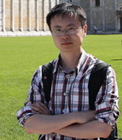Speakers
| Prof. Yonghui Li (ARC Future Fellow, Fellow IEEE) The University of Sydney, Sydney Yonghui Li is now a Professor and Director of Wireless Engineering Laboratory in School of Electrical and Information Engineering, University of Sydney. He is the recipient of the Australian Research Council (ARC)Queen Elizabeth II Fellowship in 2008 and ARC Future Fellowship in 2012. He is an IEEE Fellow. His current research interests are in the area of wireless communications. Professor Li was an editor for IEEE transactions on communications, IEEE transactions on vehicular technology and guest editors for several special issues of IEEE journals, such as IEEE JSAC, IEEE IoT Journals, IEEE Communications Magazine. He received the best paper awards from several conferences. He has published one book, more than 300 papers in premier IEEE journals and more than 200 papers in premier IEEE conferences. His publications have been cited more than 20000 times. Speech Title: Beyond 5G towards a Super-connected World Abstract: Connected smart objects, platforms and environments have been identified as the next big technology development, enabling significant society changes and economic growth. The entire physical world will be connected to the Internet, referred to as Internet of Things (IoT). The intelligent IoT network for automatic interaction and processing between objects and environments will become an inherent part of areas such as electricity, transportation, industrial control, utilities management, healthcare, water resources management and mining. Wireless networks are one of the key enabling technologies of the IoT. They are likely to be universally used for last mile connectivity due to their flexibility, scalability and cost effectiveness. The attributes and traffic models of IoT networks are essentially different from those of conventional communication systems, which are designed to transmit voice, data and multimedia. IoT access networks face many unique challenges that cannot be addressed by existing network protocols; these include support for a truly massive number of devices, the transmission of huge volumes of data burst in large-scale networks over limited bandwidth, and the ability to accommodate diverse traffic patterns and quality of service (QoS) requirements. Some IoT applications have much stringent latency and reliability requirements which cannot be accommodated by existing wireless networks. Addressing these challenges requires the development of new wireless access technologies, underlying network protocols, signal processing techniques and security protocols. In this talk, I will present the IoT network development, architecture, key challenges, requirements, potential solutions and recent research progress in this area, particularly in 5G and beyond 5G. |
Prof. Liang HuTongJi University, ChinaResearch Area: Recommender systems, machine learning, deep learning, data science, and cross-disciplinary-inspired and convergent smart technologies Liang Hu is a professor in the School of Electronic and Information Engineering at Tongji University, selected as Shanghai Overseas High-level Talent and National Foundation of China Excellent Youth (Overseas). His research areas include recommender systems, machine learning, deep learning, data science, and cross-disciplinary-inspired and converged intelligent technologies. He has published more than 40 high-level academic papers in many research directions such as cross-domain learning, multimodal learning, complex relationship learning, behavioral sequence analysis and prediction, and multi-objective optimization, including more than 20 papers in Chinese Computer Federation (CCF) Class A journals, more than 10 papers in CCF B as well as JCR Q1 journals, including WWW, IJCAI, AAAI, ICDM, ICWS, TOIS, TKDE, IEEE IS, and so on. Speech Title: New Paradigms of Generative Human-Computer Interaction and Collaboration in the Era of Large Models Abstract: The development of generative large language models, represented by ChatGPT, is in full swing, and the cross-modal generative technologies represented by MidJourney and SORA have become cutting-edge hot topics. It is said the generative AI technology is rapidly emerging. In the era of current AI large models, the development of generative technology has also brought a brand new paradigm to the modes of human-computer interaction and collaboration. This report will narrate the new paradigms of human-computer interaction and collaboration brought to us by generative AI technology in common daily scenarios, including content recommendation, game production, and smart healthcare. |
|
 | Assoc. Prof. Hongbo Li School of Management, Shanghai University, China Hongbo Li is Associate Professor of Information Systems and Management Science in the School of Management at Shanghai University, Shanghai, China. He obtained his PhD degree in Management Science in July 2014 from School of Economics and Management, Beihang University, Beijing, China. He was a visiting PhD student at Research Center for Operations Management, Faculty of Economics and Business, KU Leuven, Belgium from 2012 to 2013. His research interests include artificial intelligence, metaheuristics, project scheduling, robust scheduling, data science, business analytics, and information systems. He has published in a variety of refereed journals, such as Journal of Scheduling, International Journal of Production Research, Decision Support Systems, Expert Systems with Applications, and Electronic Commerce Research and Applications. Speech Title: Data-driven analytics for student reviews in China's higher vocational education MOOCs Abstract: The wide application of Massive Open Online Courses (MOOCs) has effectively improved the curriculum system of China's higher vocational education. In the meantime, some MOOCs suffer from poor course quality. Therefore, from the perspective of course quality improvement, we propose a data-driven framework for mining and analyzing student reviews in China's higher vocational education MOOCs. In our framework, we first mine multi-level student demands hidden in MOOC reviews by combining web crawlers and text mining. Then we use an artificial neural network and the KANO model to classify the extracted student demands, thereby designing effective MOOC quality improvement strategies. Based on the real data from China's higher vocational education MOOCs, we validate the effectiveness of the proposed data-driven framework. |
Copyright© EIMSS 2024
2024 4th International Conference on Education, Information Management and Service Science (EIMSS 2024) http://eimss.org/

